There are many schools of tantra that also reject the textual authority of the Vedas and yet proudly identify themselves as Hindus.
Embattled politicians at the fag end of their tenure have been known throughout history to try and unleash some sort of religious frenzy in a vain attempt to retain their grip on power. Salman Rushdie, in his memoir ‘Joseph Anton’, tells us how the Ayatollah of Iran unleashed a fatwa against him and his novel, ‘The Satanic Verses’. Siddaramaiah of Karnataka is no different. Although, thankfully, he does not have the Ayatollah’s unbridled power.
The incumbent chief minister has earlier signalled a dog whistle by organising a public celebration of ‘Tipu Jayanti’, a ruler known as a persecutor and murderer of Hindus. His latest move has been to make a ‘recommendation’ to the central government to recognise the ‘Lingayat’ community as a separate religion. Classic ‘divide et impera’. I can imagine Lord Curzon taking a break from getting roasted in hellfire to applaud his successor.
Siddaramaiah and his advisers seem to have floated this balloon keeping in mind the fact that the BJP’s primary support base in Karnataka is the Lingayat community, of which former chief minister B.S. Yeddyurappa is himself a member. Those with long memories would remember that, even in 2013, when the UPA government at the Centre knew it was on its way out, they decided to develop a special love for the ‘Jain’ community and conferred minority status upon them. Siddaramaiah’s is an attempt on similar lines.
Theologically, the Lingayats (followers of Basavanna, as opposed to the Veerashaivas) are quite close to the Advaita Vedanta philosophy propounded by Adi Shankaracharya, notwithstanding the attempts made by the likes of Girish Karnad in his decidedly Nehruvian-sounding play ‘Tale Danda’ to portray them as some sort of a non-Hindu sect. Simply put, the spiritual doctrine of the Lingayat community is as follows:
The individual soul is covered with mala or impurity, in the absence of which it would be all-knowing and able to comprehend that there is no distinction between the ‘self’ and the ‘other’. One who is not covered with the aforementioned mala is not limited in knowledge. An example of the same is Lord Shiva, who is worshipped in the form of a ‘Linga’. The goal of existence thus is to free one’s soul from ‘mala’ and attain a state of knowledge where there is no distinction between the ‘self’ and the ‘other’. The same can be done only under the guidance of a preceptor, and by following certain ethical and spiritual principles that are beyond the scope of this piece.
The Lingayats reject the caste system and idol worship. They also propound the equality of the sexes. There have been many Bhakti saints, including a large number of Alwars and Nayanars as well as the likes of Kabir, who have rejected the caste system and inequality based on gender. The ‘Rig’ has a celebrated verse where a poet proudly proclaims that he is a singer, his father a physician and his mother a grinder of corn.
All serious historians, irrespective of whether they are ‘communal’ or ‘secular’, agree that there is absolutely no evidence of idol worship being sanctioned or practised even in later Vedic literature, such as the Upanishads.
The Lingayat ‘recommendation’ in question is merely political in nature. Even if one were to argue that the Veerashaivas were distinct from the Lingayats (since, some say, the latter do not recognise the textual authority of the Vedas), it would be extremely difficult to say that it placed them outside the fold of Hinduism. There are many schools of tantra that also reject the textual authority of the Vedas, not to mention the good people who follow the teachings of the likes of Chaarvaka and the Ajivaka Makkhali Goshala and yet proudly identify themselves as Hindus.
Predictably, this move has led to little or no uptick in support for the Congress party in Karnataka. The fact that the party won nine seats to the BJP’s 17 in the 2014 Lok Sabha elections (Karnataka, in all, has 28), less than a year after the last assembly polls, is in itself an indicator of how early, and deep, anti-incumbency had set in.
All in all, it seems that Siddaramaiah knows that his cause is irrevocably lost, and is trying to employ a ‘scorched earth’ policy just to make things tough for his successor. To my mind, he and the Congress party are both doomed to failure. As a matter of fact, the impression that India’s ‘Grand Old Party’ is trying to cater to Muslim fundamentalists while simultaneously trying to divide the Hindu community is likely to create a bit of a Hindu consolidation in the BJP’s favour.
Raghav Awasthi is an advocate and an RSS member.




This article gives a true glimpse of the Grand old party congress… And How they follow even now British Era rule Divide and rule policy..
What could we expect frm after all a RSS thinker from tis So called Garbage Article??
Ufff! Mr To whmeva it’s concerned, You’re in the dock!!
CONGRESS would retain Karnataka and Modi is Collapsed after tis result! Mark ma comment!
Result Day u may need a nap!
Total non sense. Lingayat faith emerged as anti Vedic anti caste anti Varna movement. Advita is very much Vedic , vedanta. The author’s spin is a poor exercise in obfuscation and deceit.